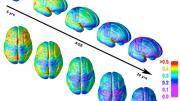Three recent features in other magazines tell stories with Harvard links:
Shing-Tung Yau, Graustein professor of mathematics and chair of Harvard's mathematics department, is interviewed in the June issue of Discover magazine. Here, his description of topology, the study of “large patterns and categories in space":
A poem might describe a farewell between lovers. But in the language of the poem, instead of a man and woman, there is a willow tree, where the leaves are soft and hanging down. The way the branch is hanging down is like the feeling of the man and the woman wanting to be together. Geometry gives us a structure of that willow tree that is solid and extensive. Topology describes the overall shape of the tree without the details—but without the tree to start with, we would have nothing.
Yau's proof of the Calabi conjecture, when he was 29, made him a star within his discipline; it also became fundamental to string theory. In the interview, beyond comparing topology to literature, he compares the Calabi conjecture to his wife. The first time he saw her, he says, "I thought she was charming—more than charming, shocking to me." And, he says, “When I look at the Calabi conjecture, it shocks me…It’s beautiful whether it’s true or not.” Yau's book The Shape of Inner Space, coauthored with Steve Nadis, is forthcoming from Basic Books in September.
The May 17 New Yorker included Malcolm Gladwell's report exploring the two main approaches to cancer drug development (the link leads to an abstract; the full article is available only to subscribers): "mass screening," which involves testing numerous drug candidates for diseases they may be effective against, and "rational design," which examines how a disease develops and then designs a customized drug to comvat it. Gladwell describes the work of Lan Bo Chen, professor of pathology emeritus at Harvard Medical School, and Safi Bahcall ’88, who together founded Synta Pharmaceuticals; it tells the story of one cancer drug, elesclomol, which in early trials demonstrated effectiveness against melanoma, one of the trickiest cancers to treat. In later trials that effectiveness disappeared, but in December, Synta reported elesclomol's effectiveness—at least in one study—against a form of leukemia. The account demonstrates how wildly unpredictable drug discovery can be, and the dramatic twists and turns this research can take.
In the same New Yorker, Ian Parker ’89 profiles Esther Duflo, a professor of development economics at MIT who tests strategies for alleviating poverty in the developing world. Parker explores the contours of development economics, including Duflo's collaborations with Michael Kremer, Gates professor of developing societies at Harvard (read about an experiment of Kremer's that tested approaches to making clean water available in Kenya), and her philosophical differences with Jeffrey Sachs ’76, Ph.D. ’81, the former director of Harvard's Center for International Development. (The full article is available online only to subscribers, but a video of Duflo and Sachs discussing approaches to international development, from the New Yorker Summit, is available to all, as is a live blog from the event.)








